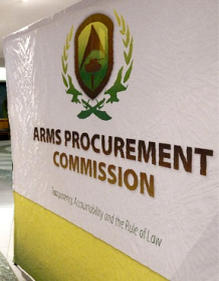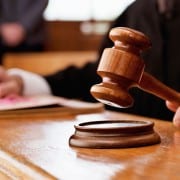|
Getting your Trinity Audio player ready...
|
 By Lee-Ann Alfreds
By Lee-Ann Alfreds
The withdrawal of arms deal critics Andrew Feinstein, Paul Holden and Hennie van Vuuren from the Arms Procurement Commission was not surprising in light of the unfair treatment meted out to detractors who have participated in proceedings.
This was the unanimous verdict of civil society organisations and arms deal and constitutional experts after the trio announced on 28 August that they would no longer participate in the commission because of “administrative hurdles in properly participating”. These include precedents from commission chairman Judge Willie Seriti indicating that they would not be allowed to use critical documents that they had not written, as well as obstacles in cross-examining witnesses.
The Arms Procurement Commission is investigating allegations of corruption and graft in South Africa’s R71-billion rand purchase of arms to replenish the national defence force in 1999. Feinstein, a former ANC member who was the co-chairman of Parliament’s standing committee on public accounts at the time of the deal, and civil society activists Van Vuuren and Holden have all written books criticising the purchase.
Responding to Lawyers for Human Rights’s (LHR) announcement, whistleblower Richard Young – who is also scheduled to testify before the commission – indicated he was not surprised considering how DA MP David Maynier had been treated when he testified earlier this month.
Young said a commission of inquiry was an “investigative entity, not a court of law so hearsay evidence (the evidence of those who relate, not what they know themselves, but what they have heard from others) is not an absolute no-no”. He also pointed out that the onus was not on the witnesses to “prove anything”. “I just need to fulfil my obligation to attend the commission under subpoena and tell what I know. I have a burden to tell the truth, but no burden to provide proof. All my testimony is meant to do is prompt the commission to go and investigate,” he pointed out.
He said Maynier, former DA MP Raenette Taljaard and Cape Town mayor Patricia de Lille had all been “made a complete fool of” thanks to the stances taken by the commissioners. “I am expecting they are going to treat Gavin Woods (who was scheduled to testify next) almost the same. You know nothing, you were not personally involved, you’ve got nothing, you can’t prove bonafides so get out of my way,” said Young, adding that if this was the way the commission treated politicians “what are they going to do to me and (activist) Terry (Crawford-Browne)?”
Waste of time
Young said LHR’s withdrawal proved the commission was a “complete waste of time”.
“What they have achieved is a kicking for touch. It has allowed (President Jacob) Zuma to get his second term. And if the report comes out in our lifetime I will dictate to you what the report will say,” he said.
Constitutional expert Professor Pierre de Vos agreed that “manner in which the commission has been conducted, the rules imposed on those who wish to assist the commission and the conduct of the chairperson during oral hearings and cross-examination have cast serious doubt about the willingness of the commission to investigate any wrongdoing in the procurement of arms”.
He said the withdrawal would “further erode any credibility the commission might have had left”. “The commission has a serious credibility problem and it is hard to see how any report it may produce would be taken seriously by any informed citizen. The commission will probably continue, but it is difficult to see what purpose would be served by continuing with it when its credibility has essentially been destroyed,” said De Vos.
Advocate Paul Hoffman of The Institute for Accountability in Southern Africa simply said “Oh sh*t” when told about the withdrawal. But he said he wasn’t surprised as he had not received answers to 13 questions he had posed to Seriti 18 months ago, regarding claims that he was biased against critics. “I fully understand that (the withdrawal) in light of what appears a continuation of the cover-up,” he said.
Support from civil society
Meanwhile civil society organisations also supported the withdrawal, with Section27 executive director Mark Heywood saying “restrictions placed on third party evidence effectively disallow important evidence that could shed light on the arms deal because they were not penned by witnesses”.
“This development is a serious hurdle in the quest for transparency and accountability,” Heywood added.
Right2Know said it was “deeply disturbed by the Seriti Commission’s failure to act in a fair and consistent way”.
”We have seen huge amounts of evidence being kept away from the public, and hostility towards whistleblowers and critics of the deal,” the organisation said.
In its statement, LHR said it had hoped the commission would get to the bottom of the deal which had seriously damaged South Africa’s institutions. “But In the end, government witnesses who testified on behalf of the state were given far more leeway than our clients. This has resulted in a fundamentally unfair process which will leave our clients unable to properly testify or defend themselves against aggressive cross-examination intended only to discredit them.”
Commission not impressed
But in a statement, commission spokesman William Baloyi said it appeared to it that the trio did not have evidence to put before it and wanted the commission to help them find proof for the allegations of wrongdoing.
“If their approach is to be followed this commission will still be here in 2016 and possibly beyond,” he said.
Baloyi said the commission was considering their decision to no longer participate in its enquiry and a decision will be made at a later stage. “In this regard we may point out that subpoenas that have been served remain valid, and if they have lapsed they can be re-issued,” he said.
.jpg)




